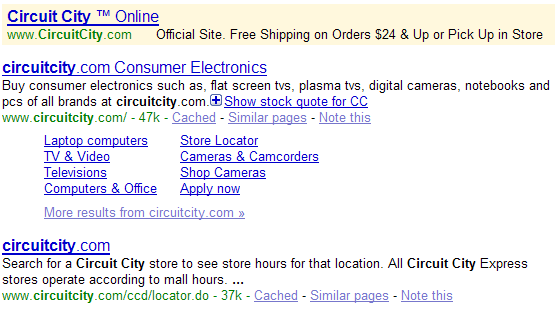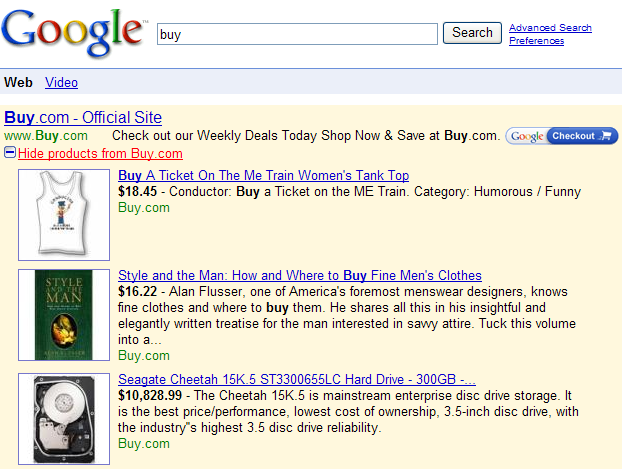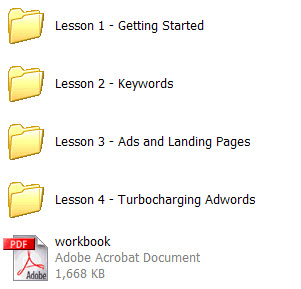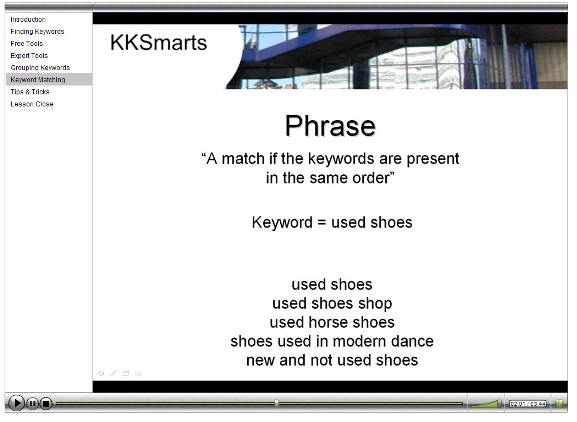Aaron recently showed me his cool flowchart software and I made a flow chart for PPC.
Let me know what you think. 🙂
Aaron recently showed me his cool flowchart software and I made a flow chart for PPC.
Let me know what you think. 🙂
On the face of it, Adwords is a pretty simple system. You bid for keywords, visitors pay per click, and the aim is to get the most visitors for the least money.
However, as anyone who has used Adwords will know, there are a number of tangles and traps, mostly designed to maximize revenue for Google.
The Google business model for Adwords must simultaneously achieve two – seemingly contradictory – goals. It must keep the bid prices high, whilst also keeping the relevance of the advertisements high. Google will not relegate relevance for higher bid prices.
Because Google Adwords works this way, this provides the bidder with opportunities to maximize value from the system, without bidding excessive amounts. One of the best approaches to Adwords is to simply “be more relevant”.
Here are five tips to help you, keeping relevance in mind.
1. How To Increase The CTR Of Individual Keywords
If you’ve got a keyword that matches the following criteria:
You can quickly raise the CTR of the keyword by simply moving it into it’s own new group and writing an ad specifically for it. This makes the ad more relevant for the keyword, as opposed to getting lost in more general group. Experiment with the Ad copy until you hit the sweet spot.
2. Play To The Known, Not The Unknown
You’ve got to get your message across very quickly, and you only have a few words to do so. To make matters worse, many others links are competing for visitor attention, and the SERP results display more words than you advertisement is permitted.
So go with the familiar. Be hyper-relevant to the visitor by talking about concepts they already know and understand.
If you need to introduce a brand new concept with a test ad, you’re going to find it tough going. Instead, repeat the keyword term in your ad title, and then use ideas and concepts that the searcher is already familiar with. If your concept takes a lot of explaining, then the place to do it is on the landing page.
Focus your efforts on getting the click first.
3. Significantly Reduce Your Bid
Not getting much, if any, response from campaigns with high bids?
Drop ’em.
This will refocus your attention on the campaigns and ads that actually do work – the terms that are most relevant to your bottom line. If you put most of your effort into what is working, rather than what isn’t, you stand to benefit more. It’s the old 80/20 principle at work. Focus on the productive, not the non-productive.
Secondly, your poorly performing words might not be worthwhile, in terms of ROI, at $2.00 per click, but might do just fine a 0.20 cents per click. Traffic numbers might drop, but so too does the cost of acquisition. If you can make that equation work for you, then it can often pay to get out of the bidding war.
4. Watch the Time
Do you monitor the time of your conversions? You should, mostly because many other advertisers won’t bother.
Use Ad scheduling to display your ads at times of the day when you’re converting the most. This technique works because chances are you’re addressing slightly different needs at different times of the day.
For example, people might not feel comfortable pulling out their credit card in the office to pay for a personal online purchase, but they will do so at home. The relevance of an ad might differ for the same visitor, depending on the context – in this case, at what time of day – they see your ad.
5. Hang Out Where Your Customers Do
A lot of advertisers have problems making the content channel work for them. But this is mostly because the content market requires more effort. The advantage are that the click prices are substantially lower.
Search on the keywords you target, and look at the top sites in the main search results. You want to make a list of all those sites that run Adsense.
Next, you need to isolate those sites where the visitor is likely to have commercial intent.
For example, if site A is about buying electric guitars, as opposed to, say, the history of electric guitars, site A is more likely to deliver real buyers. The advertisements are appearing in a more relevant context for purchasing.
Years ago some noted PPC experts like Perry Marshall recommended bottom fishing AdWords for deals in some competitive markets, claiming that as searchers moved down the listings they were more pre-qualified to make a purchase.
Google’s ad quality score algorithms, bid prices, editorial standards, and the competitive landscape of paid search have changed to where it is much harder to find deals with nickel and dime clicks. Google favors smaller tight lists of keywords over broad mix and match ad groups. And, in an attempt to kill off many forms of ad arbitrage, they made a decision to recycle leading ads against the long tail vs letting longtail advertisers get those clicks for cheap.
27 minutes into this video Dan Thies claims that their sales per click dropped off as their ads moved down the page.

Today George Michie published a blog entry on Search Engine Land about why position bidding wastes money, claiming that the value of traffic doesn’t vary by position (though stating it does vary by time of day and day of week).
The next time someone tries to engage you in a discussion about “finding the right position” for a particular term, remind them that the value of the traffic is measurable; but the cost of a position is unknown, and unknowable, changing based on the whims of your competition. Bottom line: don’t let your competitors run your search program.
Mr. Michie linked to a PDF titled An Empirical Study of Search Engine Advertising Effectiveness – though that statistical study focused on one advertiser in the automotive group. None of these citations should give you a clear optimal bid position strategy, but all should give you encouragement to test your market and find out what works best for you.
Should Circuit City bid on their own brand? How much does Google estimate that daily cost at?

That estimate may be high, but even if it is off by a factor of 10 Circuit City would be spending a quarter million dollars a month on brand equity they already built up! Given the amount of organic exposure CircuitCity.com currently enjoys for that specific query they should be able to get their ad messaging in the organic search results without paying Google.

Exclusively focusing on ROI has advertisers bidding on their own brands and giving Google a large sum of money for the brand equity and user demand that the brand has already established. But they should be able to get that ROI without paying Google a cent. If the above area in the organic search results is not enough space for Circuit City’s brand related search ad strategy, they could always use subdomains and/or launch CircuitCity.org or CircuitCity.net.
Look at how some of the web only retail and marketplace comanies like Amazon.com, Yahoo! Shopping, and eBay dominate brand searches on Google through the use of subdomains. Buying brand related searches is only a must if
Google has long pushed the value of tracking the direct ROI of ads as a way of driving their AdWords search ad marketplace, while simultaneously giving advertisers a good deal on content ads (by lowering the perceived value of content ads).
The Wall Street Journal published Rallying Cry for Display Ads, an article which makes the case that the value of display advertising is not being adequately measured and search is getting too much credit. The article promises that next week Microsoft will offer evidence “that it says proves display ads are actually better than searches at triggering consumers.”
The major conclusion of this research: By the time consumers search for a product or service, they’ve often already made up their minds to buy it. And display ads are often an important factor in their reaching that conclusion.
Even if the research is true, will Microsoft be able to use it to persuade advertisers to spend more on content ads that they have become accustomed to getting for next to nothing?
I live the Internet lifestyle and find it really unconventional. It has many advantages like the freedom to work your own hours and not commuting. Lately, I realized that over 70% of my spending are made online. All of my electronic goodies are purchased on the Web. For apparel, I still like going to stores but sometimes go direct for a few brands I am accustomed to. Sizing can be tricky too. UK8, US6, IT40, FR38, EU3, 28 are all the same size and indicates that I need to shed some pounds 🙂
Of course, buying from your favorite website is only half the fun if you didn’t click on an affiliate link. I used to go out of my way to sign-up as an affiliate before making a purchase. But since I matured and developed an extreme appreciation for blogs and websites I visit and learn from – I now go out of my way to check if they have an affiliate link for the product or service I’m itching to buy. I no longer see the benefit of being mercenary and profit from everything. Besides, the meaningful sites that entertain, educate and inspire me have tremendous value and I will be saddened if they no longer existed.
It’s amazing, really. We are very spoiled to have free access to the minds of industry leaders, heroes and really cool folks who openly share their knowledge. Clicking on their affiliate link is the least I can do to support them. Paying for their web hosting can work too, especially if they have host affiliate links.
There’s so many ways to give back. And it also makes one feel good and well behaved.
Google Checkout offers AdWords advertisers free sales processing for up to 10X their monthly AdWords ad spend. In addition, merchants using Checkout get a nice graphic near their ad which helps increase the clickthrough rate of their ads, effectively lowering their click costs while driving more traffic to the merchant sites (in exchange for giving Google an excuse to market Checkout).

More recently Google has added coupons to some of these buttons, making them even more appealing to click on.

I saw one competing site (in the retail vertical) using this coupon ad for their own brand. How silly is it for the advertiser to pay Google per click for AdWords ads targeted to their own brand AND give their customers a discount for going through Google rather than going direct?
I have been seeing a lot more Google shopping results in the organic results, which also act as an advertisement for Google Checkout.

Some AdWords advertisers have a “show products from” plus box that goes with their PPC ads

Once that box is extended the search results look like a thin affiliate site

Currently a lot of these extras appear on brand related searches, but that will change as Google…
Google has their own affiliate network through the Doubleclick Performics purchase. While Yahoo! is busy signing a deal to syndicate Google ads and Microsoft is playing catch up, Google is quietly setting themselves up as an inventory management system with more interactive ads…offering merchants convenient “free” extras each step of the way.
3 big questions from the competitive landscape
I have acquired enough knowledge in Internet marketing to help bring food (mostly desert) to the table and finance my good habits. Earlier this year, I was confident enough to introduce Internet marketing to my family. I told them that it’s a great medium to compliment their income provided that they go after sustainability and offer value to Web. My dad asked how I’m different from Carleton Sheets and those “Make Money Online” commercials on TV. I was dissapointed because I thought he knew better.
I showed them what it is I do and they appeared to be paying attention. My proposal was:
After an hour of me selling the idea and how this is really good for them, they finally agreed to learn this Internet marketing. They were given a very simple homework assignment of figuring out what they’re interested in or passionate about that was due the following week.
I came to visit them the following weekend and brought with me their new laptop. They were excited with the computer but admitted that they weren’t able to figure out what the site will be about. To me, that was the first blow and despite my disappointment, I went ahead and taught them the ultra beginner’s guide to the Web. The tutorial lasted a good 3 hours and they were clearly bored with every second of lecture.
It came to full realization that it’s tough to teach uninterested folks about Internet marketing even if they are piqued with the idea of making money. It’s even worse if family is involved because they tend to expect more from you and contribute less. Don’t get me wrong, I love my family but getting them to leech off our experience for their financial gain was a pain in the neck.
I just finished reviewing Mike Seddon’s/KKSmarts Adwords Course (not an affiliate link) and found it to be quite useful and loaded with lots of clever tips. His material is easier to understand than the default guide on Adwords. I was a bit overwhelmed with Adwords when I first started and a program like this could have easily reduced my learning curve. The program includes one workbook and 4 video series covering important Adwords topics. The videos can be viewed online or downloaded.


There are 38 total videos in Google Adwords Course and each folder is conveniently sub-divided for easier access and quicker reference.
I think both PPC beginners and intermediates can learn a lot from Adwords Course. Even if you’ve been an Adwords advertiser for over a year, you can still learn by going through over-looked Adwords features. I like Lesson 3 about Landing Pages and Ads the most because it’s a good “refresher” on conversion.

For more information – (Not an affiliate link) Adwords Course by KKSmarts
I appreciated the sales letter for the program because it was straight to the point without any hype.
The web has a wealth of information (and misinformation) which makes it tough to filter out the noise. PPC is also tricky because most of the time, there are no definitive answers and everything varies. The results of campaigns are hardly the same even if a landing page is stolen and re-used. Note: There are ways to reduce web copy theft which I’ll cover next week.
If you’re new to PPC and want to start out properly, you may get overwhelmed with the amount of research and execution involved. After finding your niche, keywords, keyword organization and landing page, the next objective is to determine the main sources for traffic.
I see this tip shared quite a bit online. A lot of folks start with Yahoo because of its traffic converting slightly better than Google. In most circumstances, Yahoo’s CPC is lower than Adwords which is an incentive to new advertisers. The downside with Yahoo is their lower quality, spammy search partners. These are mainly domainer pages or junk, spyware infested sites. They finally allowed advertisers to exclude search partners but only upto 250 sites. I have an Adwords campaign where I have over 1000 sites excluded so 250 is a bit stingy.
So if you want to collect data for a test campaign, Yahoo is good if you limit to search and exclude spending money on their search partner program. Here’s $25 of free credit to help you get started.
Vista is a vicious program that caused me tremendous grief and pain but other than that, I give Microsoft AdCenter a high approval just like XP. It is excellent for the new, super cautious advertiser on a limited budget. The two downsides are lack of market share which means fewer data and a weak content network. But if it’s your first campaign, the content network will provide little value anyway because you have very little control over it.
Microsoft is working really hard to attract advertisers and have released some of the best free tools available. My favorite is the Ad-Intelligence Office Excel plug-in and it’s compatible for both 2003 and 2007 version. The free keyword tool is the best of its kind because you access real live data, not cached like all the major tools. Aside from the cool tools, they’re also giving you a generous $75 worth of adcenter ads to get you started. Aaron and I tested Ad Intelligence back in January of this year – here’s our review.
Lots of mixed opinions from seasoned advertisers if Adwords is the best traffic source for initial testing. Advertisers in favor of Adwords as the entry point knows that Google delivers some of the highest traffic quality online. Google’s king-size ownership of the market allows advertisers to test campaign performance, keyword efficiency and landing pages with fast, accurate data to influence any changes. You’ll know in a shorter period how your offer will fare.
The other team knows Adwords as the most competitive channel on the market. A lot of new advertisers are easily discouraged if they’re not prepared for the fierce competition ahead. Expect incuring higher costs, complete lots of quality score requirements and face that risk of getting slapped around.
Again, there isn’t a right or wrong answer and agree with the logic of both sides.
Everything varies with PPC so choosing which platform to advertise in will depend on your product/service offer, competition, market size and campaign structure. Now that you’re familiar with the ups and downs of the major engines, here’s a quick summary of my baselines: